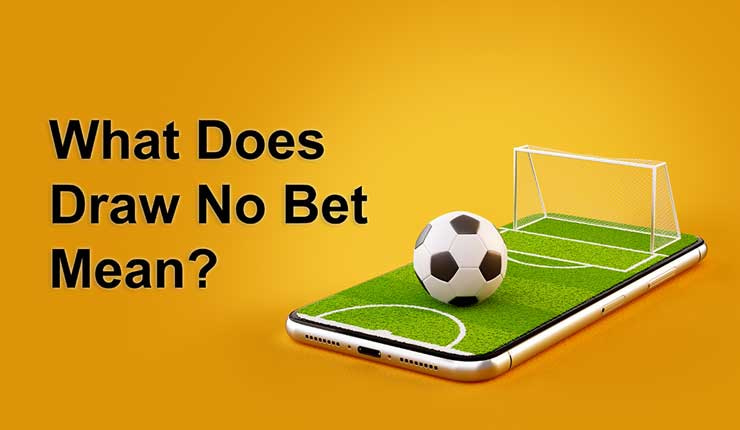The 'Draw no Bet' market is useful for when you want to back a team, but you're not convinced that they will win.
Draw no bet - also known as DNB - removes the draw result from a Match Odds bet, leaving the home win or away win to bet on. If the result is a draw, then the stake is returned.
Why draw no bet? The Team Stats Database at Goal Profits has more than 230,000 match results. Right away, you can see that 26.2% of matches have ended in a draw.

Due to number of matches that end with the score level, the draw no bet option is becoming increasingly popular amongst bettors and traders. The added insurance may well save the day on many an occasion.
Let's look at draw no bet markets, how they work and how you can use them to your advantage.
What Does 'Draw No Bet' Mean?
Draw no bet - also known as DNB - removes the draw result from a Match Odds bet, leaving the home win or away win to bet on. If the result is a draw then the stake is returned.
The draw no bet market is a particularly useful option if you want to bet on a team, but you want a little insurance in case they don't manage to win.
Here's a simple summary of draw no bet outcomes:
- Your selected team wins - bet wins
- Your selected team draws - stake is returned
- Your selected team loses - bet loses
This is what the draw no bet market looks like on Betfair Sportsbook:

It's very similar to the traditional Match Odds market, but there's no draw option.
This is the Match Odds market for the same fixture:

You can see from the difference in prices that draw no bet protection comes at a cost.
Rather than backing Liverpool to win at 2.8 in the Match Odds market, if you choose draw no bet then you will get reduced odds of 2.0.
If Liverpool win, you're paid out as normal at odds of 2.0. If Manchester City win, your bet loses. However, if the match ends in a draw, your stake is returned to you.
Draw No Bet Calculator
Use our free draw no bet calculator to maximise your betting returns. Rather than take whatever price happens to be available, make sure that you're getting the very best price every time.
It's very quick and easy!
- Search Oddschecker for the best prices for your chosen match.
- Enter the prices into our draw no bet calculator.
- Place your bet.
Here's an example using the Premier League match between Watford and Liverpool.
At Betfair Sportsbook, the Match Odds are 9.5 for a home win.

They are offering odds of 7.0 when backing Watford in the draw no bet market, which is 2.5 lower than backing the home win outright.

Oddschecker shows all bookie prices, so you're able to choose the best home win and draw prices.
For this match, the best home win price is offered by Betfred at 9/1 (decimal odds of 10.0).

The best price for the draw is 9/2 (decimal odds of 5.50) offered by Bet365.

Once you enter both of these prices into our calculator, you see that the draw no bet odds are now 8.18.
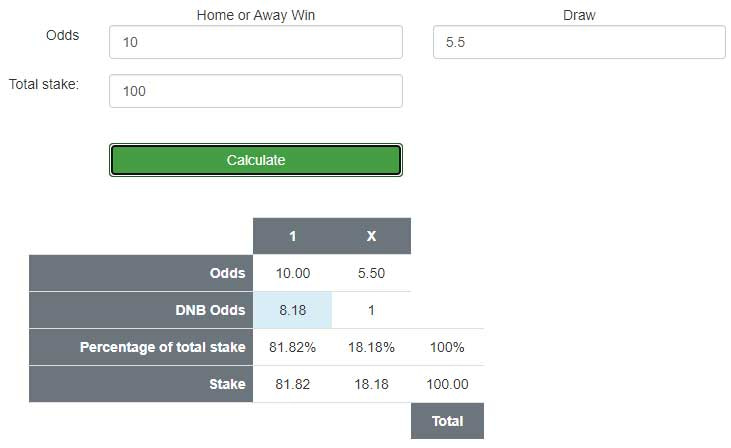
By shopping around, you're able to significantly increase the odds which were offered at Betfair Sportsbook. It takes a couple of minutes to find the best prices at Oddschecker and enter them into our calculator. Well worth the effort.
Any edge you can find will help you build your betting or trading bank long-term.
Draw No Bet Strategy
Now that you know what draw no bet means, when is the best time to choose this over a traditional 3-way Match Odds market?
The reduced odds on the favourite in the draw no bet market might not always be appealing. However, the outsider's odds may well be, especially with the additional insurance of your stake back if the match ends in a draw.
A good example of this is the Liverpool v Manchester City match:

Liverpool were 2.0 in the draw no bet market... at Anfield!
You don't see those odds on Liverpool at home often, definitely not with the benefit of your stake back if they share the points!
This particular match ended 2-2, so your stake would have been returned. There would have been plenty of opportunity for a profit for traders though, as Liverpool went in front twice during the match.
Here are few scenarios in which draw no bet may be a good option:
- When teams play defensively and don't go for the win, removing the draw is handy.
- When top teams play each other, they may be happy to settle for a draw.
- When there are injuries to top players (especially strikers) teams may have to settle for a draw.
- When a team has a new Head Coach, they may play defensively for a while as they attempt to turn their form around.
You can also use pre-match stats to find trading or betting opportunities at good odds. The general idea, in most cases, is to find lower table teams or outsiders that have a chance of beating the favourite.
Let's look at a few stats that could be useful when creating your own draw no bet strategy:
- Lower table teams with a good record against top half teams.
- Teams that are in good form home and/or away.
- Teams with strong attack stats against weaker defensive stats.
- Teams that have a high percentage of scoring first, which would give the opportunity to trade out for a profit.
- Teams which don't lose many games home and/or away, but often draw.
The tools available to Goal Profits members are designed for finding such opportunities.
For example, you can see a league table below for the Norwegian 1. Division. It only includes results for teams when they played against top half opposition, then compares their updated league position against the standard table.
The image is fairly small because the page width is restricted, but Start stand out. They're bottom of the table when playing against top half opposition at home, but second in the table away from home!
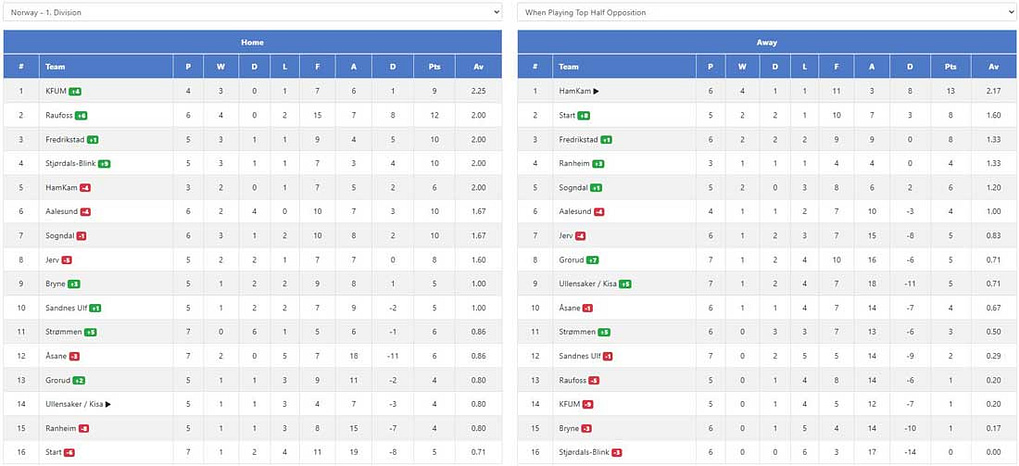
Clicking on "Start" brings up the score table as shown below.
You can immediately see that Start have played against 5 top half teams away from home and only lost once. Perhaps their remaining 3 away matches against top half teams will be ideal for draw no bet?
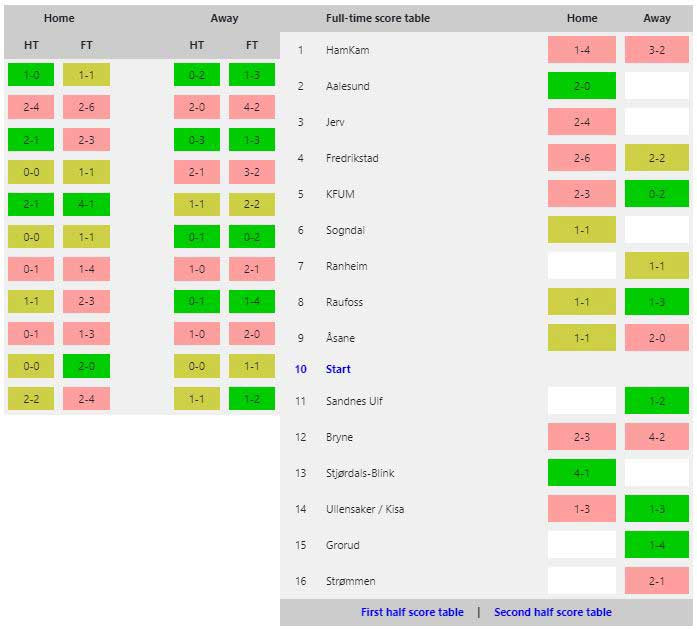
There are a number of research and trading tools available to Goal Profits members within Team Stats.
What Does 'Both Teams to Score no Draw' Mean?
A popular strategy is to cover draw no bet with both teams to score (BTTS) bet.
As long as you stake correctly, a goal for the team that you back in the draw no bet will guarantee at least scratch. In other words, no profit or loss from the bet. Your team will either win the match bringing the big profit home or, if they draw or lose, the both teams to score bet will cover your original stake.
This strategy works best when backing the underdog, so in this example I have selected Watford to beat Liverpool.
The current both teams to score price is 1.8 at Betfair Sportsbook.

And the draw no bet price is 7.0 for a Watford home win.

To calculate the stake, divide your stake by the both teams to score price.
In this example, that's £100 divided by 1.8 which equals £55.56.
I'm left with £100 minus £55.56 which equals £44.44 to back Watford in the draw no bet market.
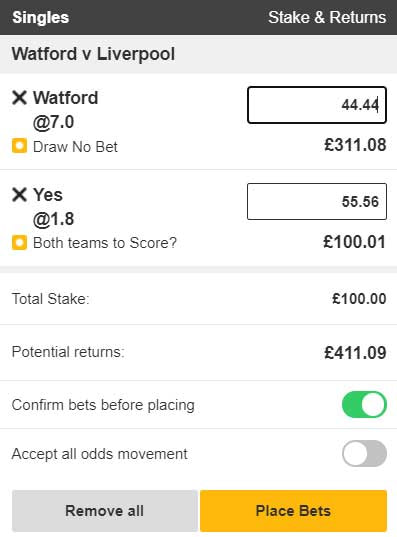
The both teams to score stake covers the total stake, bringing in a potential £100.01. If Watford win, that will return £311.08. However, if Watford win and both teams score, the total return will be £411.09 (£311.09 profit).
Here is a list of potential outcomes:
- If the match ends 1-0/2-0/3-0 or any other result in favour of the home team without the away team scoring, the bet returns £311.08 leaving £211.08 profit after accounting for the £100 stake.
- If the match ends 2-1/3-1/3-2 or any other result in favour of the home team with the away team also scoring, the bet wins £411.09 leaving £311.09 profit after accounting for the £100 stake.
- If the match ends 1-1/2-2/3-3 or any other score draw, the bet ends in scratch (no profit or loss) as the £100.01 BTTS return covers the £100 stake.
- If the match ends 1-2/1-3/2-3 or any other result in favour of the away team with the home team scoring, the bet also ends in scratch (no profit or loss) as the £100.01 BTTS profit covers the stake.
- Finally, if the match ends 0-1/0-2/0-3 or any other result in favour of the away team without the home team scoring, the entire £100 stake is lost.
The 'both teams to score no draw' strategy is a useful option when backing an underdog in the draw no bet market.
As long as your team scores a goal, you can't lose!
Draw No Bet Accumulator
A traditional football accumulator system usually revolves around the Match Odds market. You pick out a series of home wins, away wins and/or draws then wait for the results to come in.
However, the fastest growing type of acca in recent years has been the draw no bet accumulator.
As you have already read, draw no bet offers a little insurance in case your chosen match ends in a draw. It always seems to be one match that lets an accumulator down, so this is a method of avoiding that disappointment.
So how does a draw no bet work in an accumulator?
Here is an example:
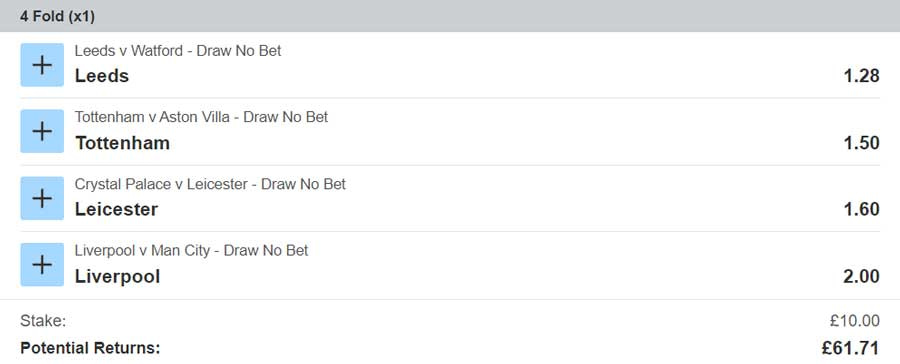
How do you get paid out?
- If all four teams win, you receive the full £61.71 return.
- If three of the teams win and the last draws their match, your bet becomes a treble on the winning teams only.
- If two teams win and the other two draw, then you will get the same return as if you'd placed a double in the first place.
- However, if any one of the four teams lose their match, then the entire accumulator goes down and you lose your stake.
What is Double Chance Betting?
Double chance is another popular football bet.
It is similar to win draw win, except that you are backing two of the three possible outcomes rather than only one. Therefore, you have 'double the chance' to win your bet.
In the example of Liverpool v Manchester City, you can back 'Home or Draw', 'Draw or Away' or 'Home or Away'.

Backing 'Home or Draw' will return a profit as long as the match ends in a home win or a draw. Essentially, you are laying Manchester City.
As you would expect though, if you cover more options in the market then your potential profit shrinks. Here's how the price drops from Match Odds to Draw no Bet to Double Chance when backing Liverpool:
- 2.8 - Match Odds (Home Win)
- 2.0 - Draw no Bet (Home Win)
- 1.53 - Double Chance (Home or Draw)
That's quite a price to pay for wanting a return on the draw. You may decide it's best to go with the draw no bet option.
Double Chance betting works best when betting on the underdogs. It's even better if the underdog is playing away from home as you can back the away win and cover the draw all as a part of the same bet for a little extra security.
However, one of the biggest issues with the Double Chance market is a lack of liquidity. You will find that the Match Odds market has much more money matched which will enable you to trade in-play.
It's bad enough for Premier League fixtures, so imagine how much worse liquidity is in League One!
The way around this is to Dutch the Match Odds market instead.
